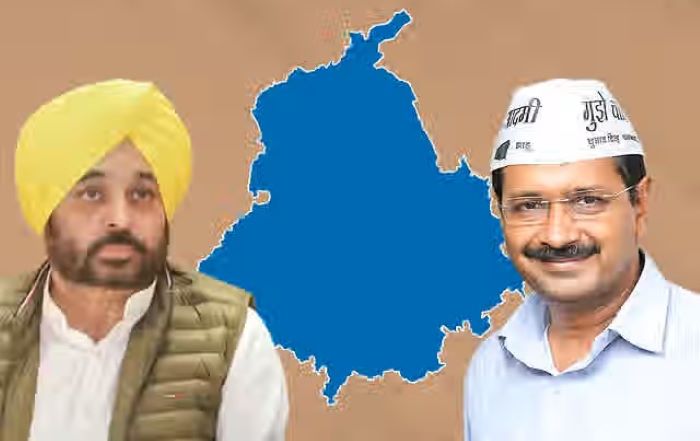
In recent months, Punjab has witnessed a curious trend — Delhi Chief Minister and Aam Aadmi Party (AAP) national convener Arvind Kejriwal announcing new projects, government schemes, and major policy reforms for the state, despite holding no constitutional position in Punjab. His repeated presence at government events and public functions, where he lays foundation stones and declares welfare programs, has reignited debate over the real source of power in Punjab’s AAP government.
During a recent public function, Kejriwal declared, “There will be no power cuts in Punjab from next year.” Standing beside him, Punjab Chief Minister Bhagwant Mann listened as Kejriwal went on to elaborate that “90 percent of the people in Punjab are getting free electricity,” and “farmers now get 8 hours of reliable power, which will soon be extended to 24 hours.” The event, where Kejriwal laid the foundation stone of a new power transmission and distribution unit, would normally be led by the state’s own Chief Minister or Power Minister. Instead, it appeared as though the national AAP chief was announcing policy directly on behalf of the Punjab government.
Constitutional Boundaries and Political Overreach
Under the Indian Constitution, all executive powers of a state rest with the Governor and are exercised through the Council of Ministers headed by the Chief Minister. Only the Chief Minister and cabinet have the authority to commit public resources, announce welfare schemes, or launch infrastructure projects. Arvind Kejriwal, as Chief Minister of Delhi and a political figurehead of AAP, has no legal or constitutional standing to make such announcements in Punjab.
Yet, this is not an isolated instance. Kejriwal has earlier made several declarations related to Punjab’s governance — such as promising “free and world-class education in Punjab’s government schools,” and vowing to open “mohalla clinics in every village.” On another occasion, he announced “government jobs for lakhs of unemployed youth,” presenting these as official guarantees rather than party manifestos. These repeated proclamations blur the line between party leadership and state governance, raising questions about Punjab’s political autonomy.
Opposition Reactions: “Remote-Control Government from Delhi”
The opposition in Punjab has strongly condemned Kejriwal’s direct involvement in state affairs. Sukhbir Singh Badal, President of the Shiromani Akali Dal (SAD), recently stated,
“It is shameful that the Chief Minister of Punjab has been reduced to a rubber stamp. Every policy, every project, every speech comes from Delhi. This is not the AAP government of Punjab — this is Kejriwal’s Delhi government operating remotely from Chandigarh.”
Badal argued that such behavior disrespects the people’s mandate, as Punjab voted for a government to be run from within the state, not dictated by an outsider. He further added that the Chief Minister’s silence on the matter reflects his lack of independence and authority.
Similarly, Leader of Opposition and senior Congress leader Partap Singh Bajwa expressed serious concern over the constitutional implications of Kejriwal’s actions. Bajwa remarked,
“Arvind Kejriwal is behaving like a super Chief Minister of Punjab. This is a direct insult to the state’s democratic structure. Punjab’s decisions must be made by Punjabis, not by someone sitting in Delhi.”
Bajwa also questioned how Kejriwal could make commitments involving Punjab’s finances, given that the state is already under heavy debt and facing fiscal strain. “When Kejriwal says ‘we will ensure 24-hour power,’ he must tell the people where the money will come from. Is he giving this from Delhi’s budget or Punjab’s empty treasury?” Bajwa asked pointedly.
Erosion of Federal Principles
Political experts view this trend as a dangerous precedent for federalism. The structure of Indian democracy allows each state its own independent government, accountable to its legislature and people. When a party leader from another state begins exercising control over state administration, it undermines the federal balance envisioned by the Constitution.
The optics of Chief Minister Bhagwant Mann sharing the stage as a secondary figure at his own state’s events reinforce the image of a “proxy government” — where real decisions and directions come from the AAP headquarters in Delhi. The political message sent to bureaucrats, ministers, and citizens is clear: Punjab’s government may be elected in Chandigarh, but it is controlled from Delhi.
The Larger Question
Punjab’s governance has now become a matter of national political discussion. Supporters of AAP defend Kejriwal’s involvement, claiming that as the party’s national convener he has every right to represent its vision. However, critics counter that party leadership cannot override constitutional authority. Punjab’s laws, budget, and projects can only be authorized by its Chief Minister and state cabinet — not by an external leader, however popular.
As Punjab faces critical challenges such as mounting debt, unemployment, and agrarian distress, the people deserve transparent, accountable governance — not decisions made behind the scenes or announced by those without legal authority. The growing perception that Punjab is being remote-controlled from Delhi has eroded public confidence and raised doubts about Bhagwant Mann’s ability to act independently as Chief Minister.
Ultimately, this leads to one pressing question: Is Arvind Kejriwal leading Punjab from Delhi while Bhagwant Mann merely executes orders on the ground? Until that question is clearly answered, Punjab’s political sovereignty — and the spirit of Indian federalism — will remain under cloud.